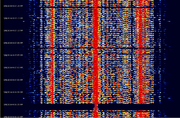Talk:Unknown 220
I also have seen / herd this in Wapakoneta Ohio , almost identical ! but mines at 220.9275 and 220 9575 with the 220.9275 being the stronger of the 2. Would you say that this Youtube video is the same as your signal your getting ? , Mbeam .
Judging from the video and audio, i'm fairly confident that the signal you received is the same one listed on the page. Would it be possible to record an IQQuadrature signals form the basis of complex RF signal modulation and demodulation, both in hardware and in software, as well as in complex signal analysis. sample of this signal for analysis? --Cartoonman (talk) 15:57, 7 March 2016 (NZDT)
I have now caught this signal (twice) doing a approximately 5 step quick frequency shift at random times like it's seeking back up to its center frequency. but unfortunately i didnt catch it on my iq recording
I have a 19 sec ( aprox 19 meg ) iq.wav baseband file i recorded from sdr# now i just need to figure out how wiki works to upload it :) --Mbeam (talk) 16:54, 7 March 2016 (NZDT)
You can upload it to a filehosting site like google drive or dropbox and link it to the page. Currently the wiki only supports direct upload sizes of up to 8mb for files, for storage reasons. --Cartoonman (talk) 17:06, 7 March 2016 (NZDT)
yeah i just figured that out currently uploading to a free hosting account now .. will be available Here .. Upload complete .. just missed it doing its little 5 step freq shift thing again too dang it lol -- Link modified now available to download ( original host wouldn't allow .wav files ) --Mbeam (talk) 17:23, 7 March 2016 (NZDT)
just caught the 5 step on video - Youttube Here's a tail end screen cap of the shift [[1] Image]--Mbeam (talk) 17:59, 7 March 2016 (NZDT)
Wow, great job! I'll take a look into these when I get a chance. --Cartoonman (talk) 03:16, 8 March 2016 (NZDT)
Additional Data[edit]
Not sure if this will help but here's a bigger waterfall image zoomed at 65536 resolution with time stampsHere's a additional IQQuadrature signals form the basis of complex RF signal modulation and demodulation, both in hardware and in software, as well as in complex signal analysis. of 1:28 length for analysis ( With the little frequency shift it does )
File size is around 301 meg Google drive link .
No problem, I'm pretty busy as of late, so i haven't had time to analyze it. The IQQuadrature signals form the basis of complex RF signal modulation and demodulation, both in hardware and in software, as well as in complex signal analysis. files allow for (somewhat) infinitely scaleable resolution. I analyze them with a russian based software called Signals Analyzer to try to get things like modulation type and symbol rate. Also, it may be possible to figure out who the signal belongs to from a fcc frequency lookup. Judging from the frequency, this could be something related to trains, but not sure. --Cartoonman (talk) 03:50, 9 March 2016 (NZDT)
i did a fcc uls search for specifically 220.9275 ( any location ) and only showed 2 active License , both no where near me ones TXTransmit other is VA, with no where near the wattage to make it to Ohio, the texas one however is a seismic earthquake sensor company http://www.fairfieldnodal.com/ wonder if its data from a earthquake monitor. another close match that might be potential is a Electric co op in indiana ( Whitewater Valley REMC ) --Mbeam (talk)
More info: taken from spectrumwiki
US242 Use of the fixed and land mobile services in the band 220-222 MHzMegaHertz (MHz) 10^6 Hz shall be in accordance with the following plan:
(a) Frequencies are assigned in pairs, with base station transmit frequencies taken from the sub-band 220-221 MHzMegaHertz (MHz) 10^6 Hz and with corresponding mobile and control station transmit frequencies being 1 MHzMegaHertz (MHz) 10^6 Hz higher and taken from the sub-band 221-222 MHzMegaHertz (MHz) 10^6 Hz.
(b) In the non-Federal exclusive sub-bands, temporary fixed geophysical telemetry operations are also permitted on a secondary basis.
(c) The use of Channels 161-170 is restricted to public safety/mutual aid communications.
| 220 MHzMegaHertz (MHz) 10^6 Hz Plan | |||
| Use | Base Transmit | Mobile Transmit | Channel Nos. |
| Non-Federal exclusive | 220.00-220.55 | 221.00-221.55 | 001-110 |
| Federal exclusive... | 220.55-220.60 | 221.55-221.60 | 111-120 |
| Non-Federal exclusive | 220.60-220.80 | 221.60-221.80 | 121-160 |
| Shared... | 220.80-220.85 | 221.80-221.85 | 161-170 |
| Non-Federal exclusive | 220.85-220.90 | 221.85-221.90 | 171-180 |
| Shared... | 220.90-220.925 | 221.90-221.925 | 181-185 |
| Non-Federal exclusive | 220.925-221 | 221.925-222 | 186-200 |
the more i dig into this one the more i think its PC interference.
I set my gain to .9 on my dongle and stuck on my lil mini home made tin can directional
and got strong signals when i placed it close to my pc and faded to 0 when i pulled it away .--Mbeam (talk) 22:51, 8 April 2016 (NZST)
hmm. I will analyze this signal as soon as I get a chance to see if there's any data involved or not. --Cartoonman (talk) 02:54, 24 April 2016 (NZST)
hey guys. page creator here. the signal seems to have gotten extremely weak and is almost gone. what i can notice is that it has about 5 second periods where it is transmitting only a signal tone till it transmits a pulsing one again --LV (talk) 10:20, 15 May 2016 (NZST) Both Still Very strong for me, strongest is 220.9275 and a weak one at 220.9575--Mbeam (talk) 05:36, 17 July 2016 (NZST)
